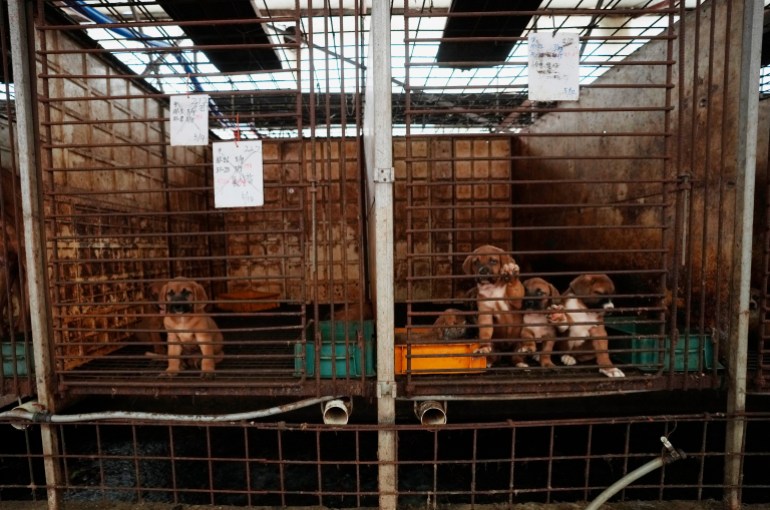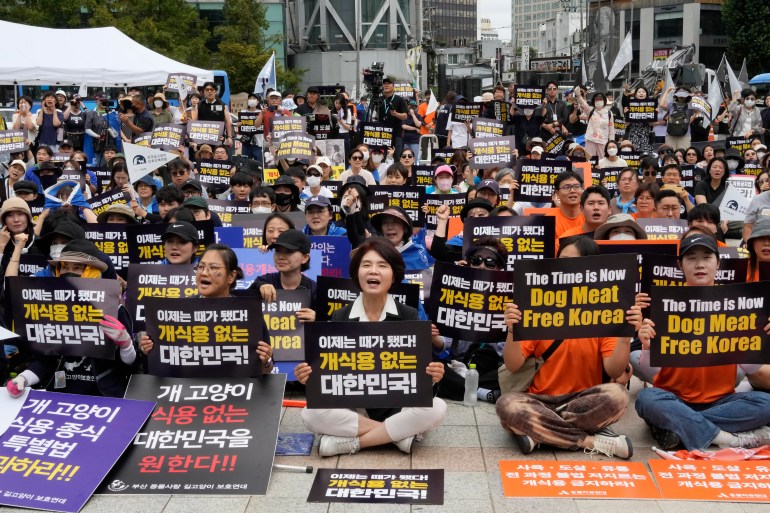The dogs bark and stare as Kim Jong-kil approaches the rusty cages housing the large, short-haired animals he sells for their meat. Kim opens a door and pets one dog’s neck and chest.
Kim says he’s proud of the dog meat farm that has supported his family for 27 years but is upset over growing attempts by politicians and activists to outlaw the business, which he is turning over to his children.
“It’s more than just feeling bad. I absolutely oppose these moves, and we’ll mobilise all our means to resist it,” Kim, 57, said in an interview at his farm in Pyeongtaek city, just south of Seoul.
Dog meat consumption is a centuries-old practice on the Korean Peninsula and has long been viewed as a source of stamina on hot summer days. It is neither explicitly banned nor legalised in South Korea, but more and more people want it prohibited.
There’s increasing public awareness of animal rights and worries about South Korea’s international image.

The anti-dog meat campaign recently received a big boost when the country’s first lady expressed her support for a ban and two lawmakers submitted bills to eliminate the dog meat trade.
“Foreigners think South Korea is a cultural powerhouse. But the more K-culture increases its international standing, the bigger shock foreigners experience over our dog meat consumption,” said Han Jeoung-ae, an opposition lawmaker who submitted legislation to outlaw the dog meat industry last month.
Prospects for passage of an anti-dog meat law are unclear because of protests by farmers, restaurant owners and others involved in the dog meat industry. Surveys suggest that a third of South Koreans oppose such a ban, though most people do not eat dog meat anymore.
The number of farms across South Korea has dropped by half from a few years ago to about 3,000 to 4,000, and about 700,000 to one million dogs are slaughtered each year, a decline from several million 10 to 20 years ago, according to the dog farmers’ association. Some activists argue that the farmers’ estimates are an exaggeration meant to show their industry is too big to destroy.
In late 2021, South Korea launched a government-civilian task force to consider outlawing dog meat at the suggestion of then-President Moon Jae-in, a pet lover. The committee, whose members include farmers and animal rights activists, has met more than 20 times but has not reached any agreement, apparently because of disputes over compensation issues.
In April, first lady Kim Keon-hee, the wife of current President Yoon Suk-yeol, said in a meeting with activists that she hopes for an end to dog meat consumption. Famers responded with rallies and formal complaints against Kim for allegedly hurting their livelihoods.

Han, the lawmaker, said she “highly positively appraises” influential figures speaking out against dog meat consumption.
Han said her bill offers support programs for farmers who agree to close their farms. They would be entitled to money to dismantle their facilities, vocational training, employment assistance and other benefits, she said.
Ju Yeongbong, an official of the farmers’ association, said farmers want to continue for about 20 more years until older people, their main customers, die, allowing the industry to naturally disappear. Observers say most farmers are also in their 60s or 70s.
Borami Seo, a director of the South Korea office of the Humane Society International, said she opposes the continued killing of millions of dogs for such a prolonged period. “Letting this silent cruelty to [dogs] be committed in South Korea doesn’t make sense,” Seo said.
“[Dog meat consumption] is too anachronistic, has elements of cruelty to animals and hinders our national growth,” said Cheon Jin-kyung, head of Korea Animal Rights Advocates in Seoul.
Sumber: www.aljazeera.com
 Skip to content
Skip to content

